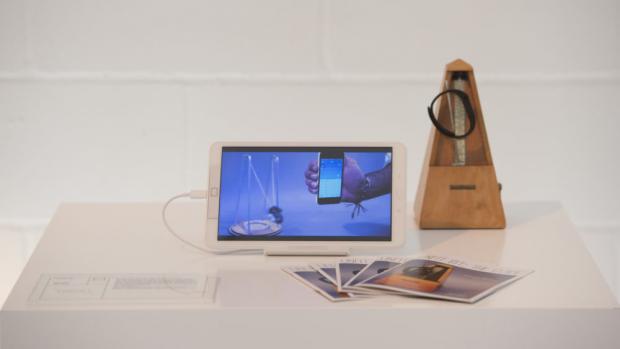“Eccentric Engineering” on Display at The Glass Room, London
The Work of Industry Assistant Professor Tega Brain Provokes Thought in British Exhibit

If you found yourself strolling down London’s iconic Charing Cross Road in the last month or so, you might have taken notice of an unusual shop. The gleaming glass-fronted space appeared to have been designed by the same minimalists who created Apple’s sleek retail oases, and the glossy consumer products on display seemed calculated to inspire anyone who wandered in to pull out their wallet.
However, “The Glass Room,” as it was called, was not an actual tech emporium but an art exhibit. As the project’s site explains, “As you look closer at the ‘products’ on display, you’ll see that they are playfully and provocatively selected to turn the technologies we all use on their head. The artworks, design pieces, and ‘Ingenius’ staff welcome you to take a look behind the screens into the hidden world of what happens to your data .... ‘The Glass Room’ is an intervention that prompts reflection, experimentation and play. A place that invites you to discuss how data and technology are changing the personal, professional and social fabric of all our lives and a way of making informed choices in the future.”
Among the artworks on display was “Unfitbits,” a work made by Industry Assistant Professor Tega Brain of Tandon’s Department of Technology, Culture, and Society in collaboration with Surya Mattu. Working at the crossroads of art, ecology, and traditional engineering, Brain creates what she terms “eccentric engineering,” objects and installations meant to illustrate important concepts. In the case of “Unfitbits” she invites viewers to contemplate the extent to which commercially available devices allow companies to track our movements and monetize the data.

Photo source: The Glass Room
Brain and Mattu’s tongue-in-cheek pitch for “Unfitbits” urges consumers to “get the chip off your shoulder” and promises, “Now you can free yourself from the pressure of always having to be active. ... Clip your Fitbit to a metronome, a drill, a bicycle wheel or a pendulum and generate valuable fitness data without lifting a finger.”
Activity data collected by Fitbits and other such tracking devices has already been used to calculate health and life insurance fees and premiums by some insurance companies, who offer schemes to incentivize their customers to track their steps and share their data. However, what Unfit Bits shows us, is that these sensors can easily be spoofed and miss so much of what health really is. The work also raises questions about personal privacy and data ownership in the age of cloud computing.
The Glass Room, which ran from October 25 to November 12, was presented by the nonprofit tech company Mozilla and curated by Tactical Tech, a Berlin-based group that provides training sessions, conducts research, and creates cultural interventions aimed at contributing to the wider sociopolitical debate around the important topics of digital security, privacy and the fair use of data.




